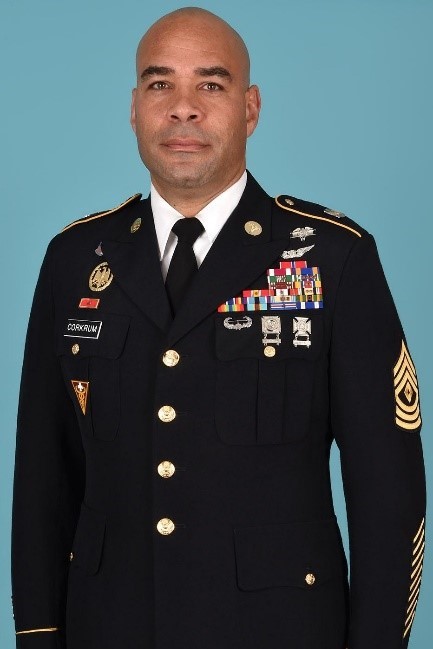
Skyline contributor, Michael Corkrum, shown here in uniform.
By Michael W. Corkrum, Skyline contributor
Twenty-seven U.S. Military veterans find Sul Ross State University’s rural setting, smaller student population, and access to faculty appealing. To be sure, veterans experience the normal frustrations and challenges that all students face in school, but veterans also face challenges unique to their situations.
Veterans are, by definition, non-traditional students. They have lived away from home, completed professional education and training, and have adopted particularly high standards of conduct.
They also tend to be particularly focused on achievement.
Some veterans, especially combat veterans, may face physical and mental health challenges and even disabilities. Among these are post-traumatic stress (PTS), arthritis, traumatic brain injuries, spinal injuries, and neurological conditions, all of which make transitioning to civilian life difficult. Students with PTS may experience anxiety when in large crowds or confining situations. This is where the small scale of the Sul Ross campus proves to be well-suited for these students.
Debbie Tout, Assistant Registrar and Veterans Affairs Certifying Officer, notes that veterans tend to be stoic about potentially disabling conditions and that she has experienced that they rarely complain. Tout states, “If not for their eligibility for certain VA Programs, I would generally not even know [veteran students] had any disability.”
Brooke Upchurch, a junior business administration major from Alpine, is a U.S. Air Force retiree. She explains part of her decision to attend Sul Ross is that “. . . the small class sizes and the understanding that my professors would be more accessible” made Sul Ross a good fit for her.
Robert Morris, a U.S. Army veteran from El Paso, is a sophomore Spanish major. Of his choice of Sul Ross, Morris states, “I wanted to return to a rural lifestyle and I was intrigued by the school’s small population.”
Dr. Theron Francis, Assistant Professor of English and Sigma Tau Delta Advisor in the Department of Languages and Literature, expresses both respect and concern for his veteran students.
“Veterans tend to be more confident and to participate more in classes, but also I have had some veterans with depression and other needs and who need more attention.”
Until recently, all in-coming freshman had to complete the full orientation process, including teambuilding and ice-breaking activities with the intent for new students to feel a part of the university community. Veterans tend to arrive at school already having significant experience in these areas, as well as having already adjusted to living away from home. Some veteran students simply wish to focus on the academics of university over the social networking. Tout remembers a veteran once saying to her, “I am not here for all the extras. I just want to get my education and move on.”
Upchurch echoes this drive and focus. “My GPA is as important to me as my annual evaluation was while serving.”
Morris, who continues to serve, points out the added complications of school for a reservist, stating, “As a reservist, my training schedule often conflicts with school; there are just more hoops to jump through to get your benefits.”
Some of our veterans have completed coursework at other institutions and describe their experience at Sul Ross favorably as compared to other institutions. Morris shares, “I love that, if I should have a problem or question, I can easily get ahold of a semi-familiar face who’s eager to help.”
Having completed only online courses before coming to Sul Ross, Upchurch finds, “Being face-to-face with my professors and peers has added an extra element to learning that made going back to college more enjoyable.”
Educational benefits from the Department of Veterans Affairs and the military services give veterans and their families a financial advantage when pursuing education. Tout notes, “The thirty family members currently using these benefits reflects a steady increase each year.”
Tout points out that the university’s student resources also are available to veterans. The Counseling and Accessibility Office facilitates mental health and emotional well-being, as well as assisting with accommodations for disabilities.
When asked how she likes working with Veteran students, Tout replied, “The fact I can go home and say I helped a Veteran today is awesome!”



